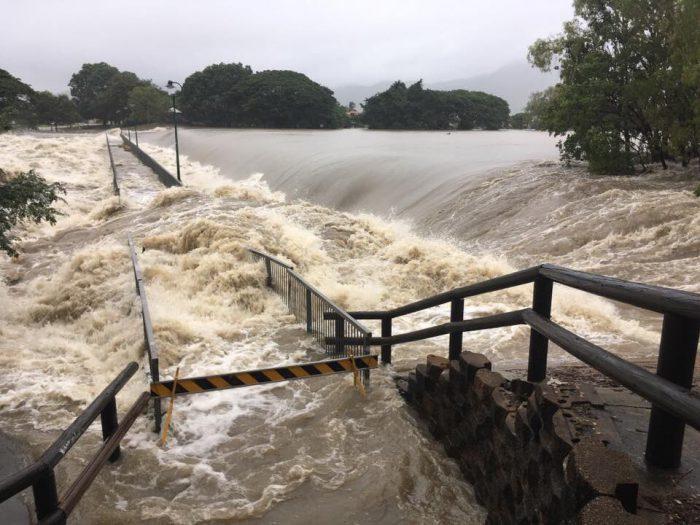Fire, drought and flooding rain: it’s time for national action on climate change
Posted By Tony Press on February 6, 2019 @ 06:00

Australia may be a sunburnt country, with droughts and flooding rains [1], but climate change is relentlessly ramping up our nation’s inherent vulnerabilities: January 2019 was Australia’s hottest month [2] on record, and nine of the 10 warmest years [3] on record occurred after 2005.
The State of the climate 2018 [4] report, produced by the Bureau of Meteorology and the CSIRO, clearly states that Australia’s climate has warmed by just over 1°C since 1910, leading to an increasing frequency of extreme heat events. The report shows that cool-season rainfall has decreased significantly in important agricultural areas of Australia, and that stream flows in southern Australia have decreased.
There has been a long-term increase in extreme fire weather, and in the length of the fire season, across a large part of Australia. The report shows that sea levels are rising and that the oceans around Australia have warmed by around 1°C, resulting in longer and more frequent ocean heatwaves.
State of the climate 2018 goes on to say that sea and air temperatures and extreme heat events will continue to increase, and that southern Australian is facing more drought. We’ll also see an increase in intense, heavy rainfall. Our sunburnt country is getting droughtier and more flood-prone.
Page 3 of the Australian on 29 January 2019 carried no fewer than three natural disaster stories, including ‘Darling awash in more fish carcasses [5]’ and ‘Reprieve at last after worst floods in a century [6]’. There’s still record flooding in Townsville, as bushfires continue to burn in southern Australia. While it might be impossible today to pin any one of these events on climate change, the balance of probabilities is that the fingerprints of climate change are right there, before our very eyes.
It’s no longer rational to ignore this evidence, or to fail to act on reports such as State of the climate 2018. All the current climate catastrophes will have huge direct and indirect economic impacts, even before we start looking at the health and social ramifications.
The direct costs of fighting this season’s Tasmanian bushfires will be in the tens of millions of dollars and could top $100 million. Then there are the numbers of hours that volunteers put in fighting the fires; the infrastructure destroyed; the businesses closed or damaged; the communities disrupted; and the health impacts on vulnerable residents.
And there’s one other potentially huge future cost of these Tasmanian bushfires: the damage to the Tasmanian ‘clean and green’ brand, when its wilderness
world heritage area has suffered two major bushfire events in six years.
None of this news of climate change leading to extreme weather events is particularly new. Significant parts of the business community have signalled the risks that climate change brings to the economy and are factoring them into critical decision-making. Climate change was a major topic [7] at the recent World Economic Forum meeting in Davos.
So why isn’t climate change one of the centrepieces of policy development in our national thinking? Over the past two decades, much work has been done inside the Australian public service on climate, climate change, adaptation and risk. But it’s difficult to draw a straight line from that work to current national policy development. Where can we see the ‘impacts of climate change’ as a central element of our national public policy?
The Australian economy will be heavily affected by the changing climate. Some of these impacts may be slow to manifest and some relatively easy to adapt to. There may even be new economic opportunities arising from climate change. But other effects will be intense, insidious and disruptive across all sections of our economy and society.
Australia will never be able to respond to these changes appropriately without a clear and explicit national discussion, and policy development that is informed by good science. This science must be about Australian weather and climate and be designed to inform the entire community about the likely climate consequences for Australia [8] and our region.
Australia has important climate science research institutions and agencies such as the Bureau of Meteorology and the CSIRO (both federal government agencies), in the university sector (for example, the Centre of Excellence for Climate Extremes, and the Antarctic Climate and Ecosystems CRC) and in the states. The most important task is to make sure that Australia’s climate science agencies and institutions have the ongoing capacity to undertake nationally important climate research.
Australia can’t afford to waste resources on disparate, uncoordinated activities in climate, weather and climate change research and development. The biggest challenge is to make sure that our national efforts align, combine and complement each other—the sum must be greater than the parts. It’s time now to clearly articulate our national climate research objectives and align them with formal arrangements and collaborations that bring together our key climate institutions and researchers.
It’s time also to bring to the policy table the excellent science that we have in Australia. The environmental, economic and social future of Australia requires it. Getting our own act together will also help us to get to grips with the climate challenges faced by our regional neighbours [9].
Article printed from The Strategist: https://aspistrategist.ru
URL to article: /fire-drought-and-flooding-rain-its-time-for-national-action-on-climate-change/
URLs in this post:
[1] a sunburnt country, with droughts and flooding rains: https://www.dorotheamackellar.com.au/archive/mycountry.htm
[2] Australia’s hottest month: http://media.bom.gov.au/releases/629/australia-experiences-its-hottest-january-on-record/
[3] nine of the 10 warmest years: http://www.bom.gov.au/climate/current/annual/aus/
[4] State of the climate 2018: http://www.bom.gov.au/state-of-the-climate/
[5] Darling awash in more fish carcasses: https://www.theaustralian.com.au/news/health-science/darling-river-awash-in-more-fish-carcasses/news-story/de6f54b05a0375a28378040cf70df553
[6] Reprieve at last after worst floods in a century: https://www.theaustralian.com.au/news/nation/rainforests-welcome-reprieve-after-suffering-worst-flooding-in-century/news-story/3d81ce64b2f1b69d4677ad099a6b186c
[7] major topic: /climate-change-dominates-the-world-economic-forums-global-risks-report/
[8] likely climate consequences for Australia: https://www.aspistrategist.ru/report/special-report-issue-49-heavy-weather-climate-and-australian-defence-force
[9] faced by our regional neighbours: https://uploads.guim.co.uk/2018/09/05/1FINAL_49PIFLM_Communique_for_unofficial_release_rev.pdf
Click here to print.